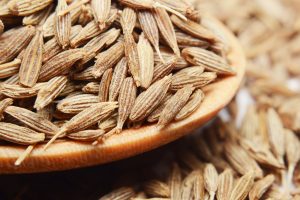Cumin seed essential Oil
Cumin seed essential oil has a rich, spicy, sensual, earthy, and masculine aroma. Many use it for fragrance applications. In aromatherapy, it is therapeutic for Toxin Buildup, Poor Circulation, Low Blood Pressure, Colic, Stomach Cramps, Indigestion, Gas, and Fatigue. Recent research has also found that cumin essential oil may enhance conventional insecticides against mosquitoes.
Furthermore, cumin oil has found usage in the woody-floral perfumes; its usage is, however, limited to trace amounts used to introduce green-spicy and green-woody top perfumery notes. Modern aldehyde fragrances use cumin essential oils to differentiate themselves with special effects.
Cumin essential oil makes for a nice blend, especially with oils that fall within the spice, citrus, and wood families.
Cumin seed essential oil in History
Cumin essential oil has a rich portfolio of attributes: bactericidal, carminative, digestive, diuretic, antiseptic, antispasmodic, detoxifier, emenagogue, stimulant, nervine, and is a tonic compound. These attributes are the basis for which cumin renders numerous health benefits, which one can easily incorporate in any health regimen either as a spice or as a therapeutic ingredient.
Cumin is an annual plant of the Apiaceae family. Its cultivation mostly occurs in Morocco, Turkey, Cypress, Malta, Lebanon, China, Spain, and Russia. Scientifically, cumin is known as Cuminum Cyminum; it is one of the essential oils that are popular since it is used as a spice globally.
Traditionally, its usage was to address numerous health conditions like sexually transmitted diseases, anorexia, and gynaecological ailments. It served to stimulate metabolism and appetite, treating neurological disorders, and enhancing harmony between the body and the mind.
Today, cumin seeds and cumin oil are used for cosmetic purposes, culinary applications, and medicinal purposes. Cumin essential oil is ideal as a herbal remedy, condiments, and remedy for inflammations, sores, bites, irritations, and rashes. It mainly addresses issues such as colic, dyspepsia, and sluggish digestion.
When looking for cumin essential oil, one should see to it that the method of extraction is steam distillation. Cold press or expeller-pressed are methods that produce vegetable oil or carrier oil and not essential oil. To extract cumin essential oil through distillation, one needs to use dried and crushed cumin seeds.
Moreover, massage therapists often flaunt cumin essential oil as being the secret ingredient for deep relaxation.
Cumin essential oil comprises of monoterpenes and aldehydes, with its components being cumin aldehyde, Cymene, Phellandrene, Myrcene, Limonene, Farnesene, and Caryophyllene.
Cumin seed essential oil Uses
All the benefits that can be derived from cumin originate from cumin essential oil. In the purest form of essential oil, it becomes much more effective compared to using cumin seeds. So here are some of its benefits.
1. Supports digestion
Cumin enhances digestion, but it has to be used in lower quantities. Higher dosages will inhibit digestion and cause vomiting. Cumin essential oil enhances the release of bile juice and gastric juices and also stimulates peristaltic motion in the intestines. Additionally, it treats low appetite by way of its exciting smell.
2. Relieves flatulence
Cumin has carminative properties that successfully drive away gases that are locked in the intestines. It also helps prevent further development of gases in the stomach.
3. Antiseptic
The antiseptic nature of cumin essential oil enables it to treat internal and external wounds. Add a few drops of cumin oil to a carrier oil and apply topically to the wounded areas.
4. Diuretic and detoxifier
Cumin is known to enhance the elimination of harmful toxins in the body, boosting in frequency and in quantity, to speed up the elimination of dirt in the body. Increased urination speeds up the loss of fats and excessive weight; it encourages digestion as well as inhibits gas formation. It eliminates excessive water that could build up in the body and therefore prevents any swelling that could occur in the body. Additionally, it decreases blood pressure levels.
5. Antispasmodic
Cumin essential oils have excellent spasmodic properties that help the essential oil cure all types of spasm as well as related issues like convulsions, cramps, non-stop coughing, among others.
6. Bactericidal
Cumin essential oil is a powerful bactericide and can be used to manage any condition that is brought about by bacteria, including diarrhoea and cholera. It is excellent for treating internal bacterial infections like those in the intestines, colon, and urinary tract. It also treats external bacterial infections like on the eyes, ears, skin, and wounds.
7. Flavoring agent
Cumin essential oil is a culinary spice that is used around the world to add flavor to various dishes. It can be used as a substitute for ground cumin. Add a few drops of cumin essential oil to curries, stews, and soup for the added flavor.
Contraindications
Cumin essential oil is phototoxic and should, therefore, not be exposed to the sun after application. Also, users should use this oil in very mild dosages as it has a strong smell that may cause nausea or headaches.
Cumin oil can cause skin sensitivity. Thus, when applied topically, it should be diluted with a carrier oil. It is advisable to perform a skin patch test to check for any allergic reactions. Also, avoid contact with eyes, ears, and other sensitive areas.
Pregnant and nursing women should avoid using cumin essential oil. Keep out of reach of children.
Research studies show the effectiveness of cumin seed essential oil on the health of dogs. This is attributed to prostaglandin compounds present in the oil. These compounds tend to improve the dog’s immune system, hence reduced cases of illness. Even so, it’s advisable to consult a veterinarian before significantly changing the diet of your pets.
Disclaimer
These statements have not been evaluated by the Food and Drug Administration. This product is not intended to diagnose, treat, cure or prevent any disease. If you are pregnant, nursing, taking medication, or have a medical condition, consult your physician before using this product.
Sources
2.https://academic.oup.com/fqs/article/2/1/1/4823052
3.https://www.aromaweb.com/essential-oils/cumin-oil.asp
4.https://www.edensgarden.com/products/cumin
6.https://www.sciencedirect.com/topics/agricultural-and-biological-sciences/cumin
7.https://essentialoils.co.za/essential-oils/cumin.htm
8.https://www.natur-journal.de/en/oils/black-cumin-oil-for-dogs-effect-application-studies-buy/




You must be logged in to post a comment.